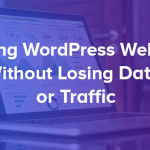When creating a website, one of the most important decisions you’ll make is what type of hosting plan to purchase. If you use a platform like WordPress, you’ll need hosting in order for your website to be available online. What’s more, selecting the right option is vital.
Two of the most popular choices for first-time website owners are shared hosting and WordPress hosting. Shared hosting is a type of low-cost plan where you share space on a server with other sites. WordPress hosting (which can be shared or not) means that the server comes optimized with the specific platform in mind.
An Introduction to Shared Hosting
Put simply, a web hosting plan is a service that enables you to rent space for your website on a server. This is what gets your site online, and enables people to visit it. There are many different types of hosting plans available, however, and each one differs in terms of price and potential benefits.
One of the most common options is a shared hosting plan, where a single server is split between multiple websites. This is in contrast to dedicated hosting, where a single site has a physical server all to itself. Shared hosting is a popular choice for new and smaller sites, largely due to its low cost (often $5 per month or less).
While price is the primary benefit, there are some potential downsides to this kind of hosting. You’ll have to share resources with other websites, for example, which means your performance can suffer if those sites get a lot of traffic. Security can also be a concern, although a quality provider will offer additional protections.
The Differences Between Shared Hosting and WordPress Hosting
As the name suggests, WordPress hosting is web hosting that has been optimized for the needs of a WordPress website. It’s important to understand that this isn’t a type of plan in the same way that shared hosting is. WordPress hosting can be shared, dedicated, or something else entirely.
What matters is that WordPress hosting better meets the performance and security needs of sites built using the platform. You may also get access to platform-specific features such as pre-installed sites, automatic WordPress updates, and dedicated WordPress support.
The details of your plan will depend on the provider you choose, of course. In addition, many hosts also offer both managed and unmanaged WordPress hosting plans. Unmanaged plans leave site optimization and server management up to you. A managed plan is slightly more expensive but provides you with a lot more help keeping your site running smoothly.
How to Decide Which Type of Plan Is Best for Your Site
Both traditional shared hosting and WordPress hosting are viable options, making it difficult at times to choose the right one. However, directly comparing the two can make the decision easier.
Especially when you’re first starting out, one of the main criteria to consider is cost. As previously mentioned, shared hosting is about as cheap as it gets. This makes it a perfect option for those setting up new websites and blogs.
However, you’ll find that shared, WordPress-specific hosting plans can be almost or just as affordable as more platform-agnostic options. For that reason, it’s well worth looking into a WordPress hosting plan for most sites. A WordPress plan will be carefully designed to address the needs of your specific site, which is a significant benefit.
Ultimately, there’s no one ‘correct’ choice of hosting for every website. You’ll need to assess the individual needs of your business and site. However, most WordPress users will be better off with a plan that takes their specific needs into account, whether that’s a shared option or something more powerful.





